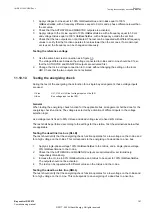
11.7.4.1
Verifying the settings
GUID-864636E0-6399-44E1-BD2C-C2113FB78C61 v3
Time measurement and the injection of current and voltage can be done using a common test
equipment.
Verification of the
START
value and time delay to operation
1.
Connect the test set for the injection of three-phase currents and three-phase voltages to the
appropriate current and voltage terminals of the IED.
2.
Ensure that the settings in the IED are appropriate, especially the
CurrStartLevel
,
FreqHighLimit
,
FreqLowLimit
,
UHighLimit
and
ULowLimit
setting.
3.
Supply the IED with three-phase currents and voltages at their rated value.
4.
Slowly decrease the frequency of the applied voltage until it crosses the frequency high limit and
the
START
signal appears.
5.
Check that the
FREQOK
signal appears.
6.
Compare the operate value to the set frequency high limit value.
7.
Decrease the frequency of the applied voltage until it crosses the frequency low limit and the
START
signal disappears.
8.
Check that the
FREQOK
signal disappears.
9.
Compare the reset value to the set frequency low limit value.
10. Readjust the frequency of the applied voltage (with steps of 0.001 Hz/s) to a value within the set
frequency band limit.
11. Ensure that the
START
signal reappears.
12. Wait for a time corresponding to
tCont
and ensure that the
TRIP
and
TRIPCONT
signals are
generated.
13. Measure the time delay for the
TRIP
signal and compare it to the set value.
Verification of the
ACCALARM
value and time delay to operation
1.
Connect the test set for the injection of three-phase currents and three-phase voltages to the
appropriate current and voltage terminals of the IED.
2.
Ensure that the settings in the IED are appropriate for the default settings, especially the
CurrStartLevel
,
FreqHighLimit
,
FreqLowLimit
,
UHighLimit
and
ULowLimit
setting.
3.
Supply the IED with three-phase currents and voltages at their rated value.
4.
Slowly decrease the frequency of the applied voltage until it crosses the frequency high limit and
the
START
signal appears.
5.
Continuously change the frequency of the applied voltage, so that for a certain time the
frequency is outside the set band limit and falls gradually within the band limit.
6.
Count only the time when the frequency lies within the set frequency band limit. Wait for a time
corresponding to
tAccLimit
and ensure that the
ACCALARM
signal appears.
7.
Measure the time delay for the
ACCALARM
signal and compare it to the set value.
Extended testing
1.
To check the value of
TRIPACC
, repeat the above test case in such a way that the frequency of
the applied voltage is within the set frequency band when time approaches the
tAccLimit
setting
value.
Verification of generator start and stop logic
1.
Ensure that the settings in the IED are appropriate to the default settings, especially the
CurrStartLevel
,
FreqHighLimit
,
FreqLowLimit
,
UHighLimit
and
ULowLimit
.
2.
Ensure that the setting
CBCheck
is enabled.
3.
Supply the IED with three-phase currents and voltages at their rated values.
4.
Slowly decrease the frequency of the applied voltage until the
START
signal appears.
5.
Activate the
CBOPEN
input signal.
6.
Slowly decrease the injected current below the
CurrStartLevel
value until the
START
signal
disappears.
7.
Compare the current magnitude value to the set value.
Section 11
1MRK 511 403-UEN Rev. L
Testing functionality by secondary injection
146
Bay control REC670
Commissioning manual
© 2017 - 2022 Hitachi Energy. All rights reserved
Summary of Contents for REC670
Page 1: ...Relion 670 SERIES Bay control REC670 Version 2 2 IEC Commissioning manual ...
Page 2: ......
Page 28: ...22 ...
Page 54: ...48 ...
Page 60: ...54 ...
Page 66: ...60 ...
Page 90: ...84 ...
Page 212: ...206 ...
Page 218: ...212 ...
Page 232: ...226 ...
Page 240: ...234 ...
Page 241: ...235 ...
















































